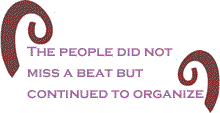I
have to ask myself, like any other American, do I feel American?
One thing I know is that if I voice that I don�t, I may
get attacked by the Right as not being so. So I better be
careful of what I say�naw, I don�t think so! I don�t feel
American; and there�s a damned good reason why.
 I�d
like to say that I feel that I am a piece of this American
fabric, but right now, it ain�t happenin��There is no �Don�t
Ask, Don�t Tell�, there is no anti-immigration battle going
on about us. Is that to say that all is well with Black
folks? Hardly. I�d
like to say that I feel that I am a piece of this American
fabric, but right now, it ain�t happenin��There is no �Don�t
Ask, Don�t Tell�, there is no anti-immigration battle going
on about us. Is that to say that all is well with Black
folks? Hardly.
Did
you hear the State of the Union Address? Our President takes
no leadership on addressing the dire needs of Blacks. As
of January 2011, the unemployment rate among Blacks is officially
upwards of 16% (no telling what it is unofficially), compared
with 8% for whites.
I�ve
said in several of my commentaries past that �we�re under
attack.� I mean that in several ways�for those of us not
rich, we�re under attack; for those of us who own nothing,
we�re under attack; for those of us who are Black, we�re
under attack. What we know is that there is a disconnect
that hinders Blacks from evenly competing in American society.
The perks and the work must come at the same rate for all
races. If it doesn�t, then we, Black people, fall behind.
What
am I talking about? Since Blacks have been shown to �underperform�
on standardized tests and graduation rates, getting to the
root cause of the �underperformance� is crucial. What we
know is that all human beings have pretty much equal potential
from birth. The environmental circumstances dictate how
well a person may or may not do. Blacks (and the Supreme
Court) have learned that a lack of resources, lack of exposure
and/or a lack of proper teaching methods can hinder a student
from attaining superior results. When this happens, it�s
not accidental.
A Pennsylvania high school has scrapped
a mentoring program, which allowed students to be taught
by instructors of their same race for a few minutes each
day. What followed was a storm of criticism over the initiative.
Why the criticism?
McCaskey East High School in Lancaster, Pennsylvania, instituted what it described
as a pilot program meant to enrich �students� experiences
through mentoring� and was derived from research �that shows
grouping black students by gender with a strong role model
can help boost their academic achievement and self esteem,�
according to a school statement.  The
junior class at McCaskey East voluntarily divided themselves
�by gender, race and/or language.� The groups met for six
minutes each day and for 20 minutes twice a month. The
junior class at McCaskey East voluntarily divided themselves
�by gender, race and/or language.� The groups met for six
minutes each day and for 20 minutes twice a month.
Educators at the school said they initially noticed strong bonds being formed
between all students and mentor teachers,� according to
a statement. Though the principal of the school defended
the policy, some analysts - critics - said the experiment
was misguided.
�In visiting the classrooms, I saw students planning their path for success
after graduation,� said school Principal Bill Jimenez. That�s
something that previously had not been a part of the norm.
A 1954 Supreme Court case ruled that segregation in public schools was unconstitutional,
overturning an earlier ruling in a decision that determined
�separate educational facilities are inherently unequal.�
The critics used Brown v. Board to undergird their argument.
But as educators look for new ways to improve student aptitude, some pointed
out that McCaskey
East High
School could have the right idea, noting that the �mentoring�
idea had nothing to do with separate educational facilities.
But this program came under attack - from those who used
[reverse] racism to dissuade a methodology that �helps lift
sinking boats.� Property taxes, employment opportunities
(of parents), access to resources and legacy factors, all
play a role in the growth and success of a student. Aside
from all things in the school setting being equal, if the
outlying factors aren�t equal, then actual success of the
student won�t be either.

These critics are the epitome of attacking black (and minority) men. Unfortunately,
corporate mainstream media giant, CNN, reported the story
to which I refer without identifying the critics. That�s
sort of like, the Ku Klux Klan: you know someone opposes
you, but their hood keeps them anonymous.
But someone reminded me that the President does care, is paying attention. Valerie
Jarrett, senior advisor to President Barack Obama, sat inside
the stately Secretary of War Suite in the White House late
last month and looked to the future for young African-Americans.
Jarrett, who is perhaps Obama�s most trusted confidant,
said the administration understands the growing impatience
among Americans, and African-Americans in particular, who
are faced with a 15.8 percent unemployment rate. The problem
is this: the black unemployment rate is rising as the overall
unemployment rate is dropping.
People want you to believe that the Obama administration is listening carefully
to the black electorate, particularly as Obama gears up
for a rough-and-tumble 2012 re-election campaign. There
is nothing in the past two years you can show me that indicates
he is. They only thing I can conclusively allude to that
this administration has unequivocally championed on behalf
of the black constituency, is the 100-to-1 crack-to-powder
disparity in sentencing�and it still isn�t equal.

It�s hard to feel American when other Americans are eroding the gains you�ve
made (civil rights laws), eviscerating the remedies that
were put in place to correct past wrongs (Affirmative Action),
and downgrading the cultural stakes that brought you to
a place of equality. It�s February, and you can�t even tell
it is Black History Month! No, I don�t feel American, because
we�ve been swept under the rug at best, forgotten at worst.
The recent proposed budget cuts only make my case stronger.
Discretionary cuts hurt poor and working class Americans,
a larger proportion of the Black population. That�s why
I don�t feel American today. Check with me tomorrow.
BlackCommentator.com
Columnist, Perry Redd, is the former Executive
Director of the workers rights advocacy, Sincere Seven,
and author of the on-line commentary, �The Other Side of the
Tracks.� He is host of the internet-based talk radio
show, Socially Speaking in Washington,
DC.
Click
here to contact Mr. Redd. |

